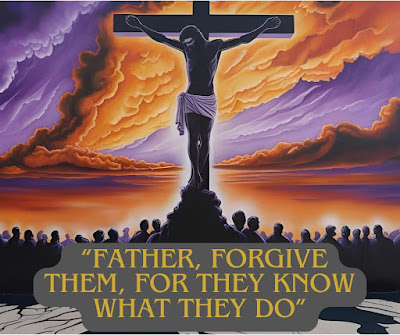“Father, Forgive Them, For They Know What They Do” — A Call to Forgiveness in Today’s World
Luke 23:34
As Jesus was crucified, surrounded by mocking voices, Roman soldiers, and religious leaders who condemned Him, He uttered these astounding words:
“Father, forgive them, for they know not what they do.”
This prayer wasn’t just for the Roman soldiers. It included the religious leaders, the angry crowd, and even His own disciples who had abandoned Him. Jesus, in the midst of pain and injustice, chose forgiveness over revenge — a divine act that still speaks powerfully to our broken world.
1. Forgiveness Is the Heart of the Gospel
“But God shows his love for us in that while we were still sinners, Christ died for us.”
(Romans 5:8)
Jesus’ words model the very essence of the Gospel: grace for the undeserving. We live in a world where people hurt each other — often unknowingly — through prejudice, violence, betrayal, and ignorance. Still, Jesus’ prayer invites us to embrace radical forgiveness, even when it feels impossible.
2. People Are Often Spiritually Blind
“The god of this world has blinded the minds of the unbelievers…”
(2 Corinthians 4:4)
“They know not what they do” is not an excuse for sin, but an acknowledgment of spiritual blindness. Today, many still act in ignorance — whether through systemic injustice or personal sin. Instead of responding in anger, Jesus calls us to pray for eyes to be opened.
3. Forgiveness Is Not Optional for Believers
“Be kind to one another, tenderhearted, forgiving one another, as God in Christ forgave you.”
(Ephesians 4:32)
In our homes, churches, and nations, we must model the same mercy that we have received. Forgiveness is not a feeling — it’s a choice and a command.
What Does This Mean for Us Today?
1. Our World Still Cries Out for Forgiveness
Turn on the news — and you’ll see conflict, war, hatred, division, and violence. People continue to hurt one another out of fear, ideology, prejudice, or ignorance. The words of Jesus are still painfully relevant:
“They know not what they do.”
In such a world, Jesus’ prayer is a model for us. It reminds us that forgiveness is not weakness, but strength. It’s not saying “what they did was okay” — it’s saying, “I won’t let bitterness consume me.”
2. Ignorance Still Leads to Harm
So many of today’s issues are rooted in misunderstanding — racial prejudice, religious intolerance, political hatred, or even family conflicts. People hurt each other not always because they are evil — but because they are blind.
They don’t see the full truth. They don’t understand the other person’s pain.
They don’t realize the long-term consequences of their actions.
Jesus’ words call us to respond not with rage, but with compassion and clarity. To be people who educate, forgive, and restore — not just retaliate.
3. Forgiveness Brings Healing — To Others and Ourselves
When Jesus forgave, He wasn’t just healing the people who hurt Him — He was also breaking the cycle of hate. Forgiveness stops the poison from spreading.
In a world full of personal betrayal, broken families, generational trauma, and social injustice — we need healing. And that healing starts with forgiveness.
Yes, it’s hard. Yes, it’s a journey. But it’s the only way forward.
4. We Are Called to Imitate Christ
If Jesus could forgive from the cross — in His weakest, most painful moment — then we are challenged to do the same in our own lives. Not because people deserve it, but because God has forgiven us first.
You may be holding on to bitterness. Someone may have hurt you deeply. But through Jesus, you have the power to release that burden.
Not by pretending it never happened — but by choosing to let go, and let God handle the justice.
Conclusion
The world doesn’t need more hatred — it needs healing. And healing begins with forgiveness.
Let Jesus’ words shape your heart:
“Father, forgive them…” — and may you echo that prayer every day.
